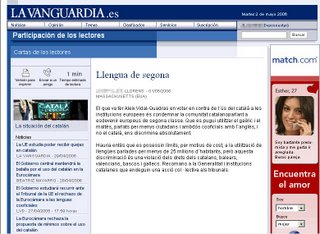
A close relative of mine, who also happens to live in Massachusetts, got published the attached letter in the Spanish newspaper La Vanguardia. He tells me that when you send a letter to La Vanguardia, several things happen: they always give it a haircut, without any reason, even if the letter is relatively short. They love to edit it. The result is very often a little bit awkward, but the truth of the matter is that the try to keep the essence of the message.
The second thing that happens is that they correct your spelling and grammar mistakes, even though Bill Gates takes care of the first ones through his outstanding word spell check (in this case for Catalan). But my relative never learnt Catalan at school, it seems that it was banned when he studied, and from time to time, he makes some grammar mistakes, like making intransitive transitive verbs. He does not feel bad about it, however, because in the Valencian variety of Catalan, the construction would have been correct. There is always a loophole.
This is the English version of the article:
"Second class language
What Aleix Vidal-Quadras did when he voted against the use of Catalan in the European institutions, was to condemn the Catalan speaking community to become second class Europeans. The fact that Gaelic and Maltese, spoken by far less citizens and both of them co-official with English, can be used and not Catalan, discriminates us absolutely.
I would have understood that limits are imposed on languages spoken by less than 25 million people due to cost reasons, but this targeted discrimination is a violation of the rights of Catalans, citizens of the Balearic islands, Valencians, Galicians and Basques. I advise the Catalan government and institutions to file a class action lawsuit."
This is the original modified version in Catalan:
"Llengua de segona
El que va fer Aleix Vidal-Quadras en votar en contra de l´ús del català a les institucions europees és condemnar la comunitat catalanoparlant a esdevenir europeus de segona classe. Que es pugui utilitzar el gaèlic i el maltès, parlats per menys ciutadans i ambdós cooficials amb l´anglès, i no el català, ens discrimina absolutament.
Hauria entès que es posessin límits, per motius de cost, a la utilització de llengües parlades per menys de 25 milions d´habitants, però aquesta discriminació és una violació dels drets dels catalans, balears, valencians, bascos i gallecs. Recomano a la Generalitat i institucions catalanes que endeguin una acció col · lectiva als tribunals."
 For those who do not know him, Aleix Vidal-Quadras is one of the vice presidents of the European parliament. He is a Catalan, member of the right wing popular party and he was the swing vote against the resolution to allow us to be able to communicate with the Eurochamber in Catalan. He is a clear example of why Catalans have never won any war in the last 600 years, there was always a "botifler" (traitor) that would sell our interests. Note that out of 14 vice presidents, there are 2 Catalans, that's 15% of the presiding body. I really cannot understand.
For those who do not know him, Aleix Vidal-Quadras is one of the vice presidents of the European parliament. He is a Catalan, member of the right wing popular party and he was the swing vote against the resolution to allow us to be able to communicate with the Eurochamber in Catalan. He is a clear example of why Catalans have never won any war in the last 600 years, there was always a "botifler" (traitor) that would sell our interests. Note that out of 14 vice presidents, there are 2 Catalans, that's 15% of the presiding body. I really cannot understand.When asked, Aleix said that he had voted against due to technical reasons, the complexity of having even more languages in the E.U.
This is my answer to that:
- You know my opinion about languages in the EU. Only English should be use by the people who work there (most probably a more legally acceptable compromise would be, however, that the 3 european union languages that are also official in the United Nations, become the three working languages in the EU: English, Spanish and French)
- Communication between the citizens and the EU should be in the official language of the citizen. A webportal set up and paid by the regional or national government, should act as intermediary.
- What you you cannot do is a targeted ethnic discrimination. If you are Maltese, you can use your small little language, if you are Catalan, you cannot. THIS IS A CIVIL RIGHT VIOLATION. Therefore I encourage all you Catalans to file a complaint to the European Ombudsman following this link.
- Finally I would like to add that all these problems will be solved in 15 to 20 years. Today I attended a series of speaches/presentations at the JFK Library in Boston organized by MassMedic. One of the keynote speakers, Ray Kurzweil talked and demonstrated the future of interpretation with the improvement in computation. He predicted that in the next decade, google-kind interpretation algorithms will be built in our cell phones in such a way that when you call a colleague or friend in Germany, you will be speaking English and your counterpart will be hearing the same conversation in German. Both the software and the computation power will be available in any handheld device. I start to wonder why I learnt 9 languages. Looking from this perspective, Mr. Vidal-Quadras becomes irrelevant.




4 comments:
Technology! I don't know how to use my mobile now (a part of phonecalls and sms) I don't think I'll like that.
About language, you know my point of view already (very close to yours, actually).
About spelling mistakes, never mind them. I study Hispanic Philology and I make monumental mistakes from time to time.
Ian, I tried to make a complaint with the form provided, but when I pressed 'send', nothing happened. Is this another case of the EU trying to kill open source software (in this case, firefox)?
this targeted discrimination is a violation of the rights of Catalans, citizens of the Balearic Islands, Valencians, Galicians and Basques.
The groups you mention are not alone, as the policy also discriminates against the speakers of other EU languages, such as Aranese, Bable, Belarusian, Frisian, Kashubian, Ladin, Friulian, Limburgish, Low German, Luxembourgish, Mirandese, Russian, Scottish Gaelic, Welsh, Scots, Ulster Scots, Cornish, Yiddish, Sami, Wendish, Piedmontese, Lombard, Ligurian, Emiliano-Romagnolo, Venetian, Friulian, Tuscan, Umbrian, Marchigiano, Romanesco, Laziale, Neapolitan, Abruzzese, Molisano, Pugliese, Calabrian, Sicilian, Sardo campidanese, Sardo logudorese, Sassarese, Gallurese, Cimbrian, Walser German, Bavarian, Arbëreshë, Griko, Rom, Sinti, Breton, Alsatian (Elsässerdeutsch), Flemish, Frankish, Corsu, Franco-Provençal, Bressan, Dauphinois, Forèzien, Jurassien, Lyonnais, Savoyard, Auvergnat, Gascon, Ariegese, Bearnese, Landese, Languedocien, Limousin, Nissart, Provençal, Bourguignon-Morvandiau, Champenois, Franc-Comtois, Gallo, Lorrain, Norman, Picard, Poitevin-Saintongeais and Walloon, as well as the speakers of many languages of those who arrived as immigrants but are now EU citizens, such as Urdu, Mandarin, Arabic, Berber, Lao, Bahasa Indonesia, Romany, Turkish and Vietnamese, to name but a few.
But, and as you rightly point out, having all these as official languages would be impractical for financial reasons alone. According to the EU website (http://europa.eu.int/languages/en/document/59#8), the cost of the Union's current multi-lingual policy costs €1,123 million per annum, which is 1% of the annual general budget of the EU, or €2.28 per person per year.
That's about €56.15 million for each of the 20 current official languages per year. It's not unreasonable to assume that each additional language added would cost an additional 56 million - since each language would require a full set of interpreters, translators, their office space, etc.
Perhaps it would be best for the speakers of a language to finance the right of politicians from their land to speak at the European institutions in a language that only they understand. That would of course have to come out their local tax. But just like the religious tax, it ought to be optional. If every resident of Catalonia were willing to pay, it would work out at €8 per year.
It would be interesting to see how many Catalans still take language for what it evolved, as a means of communication and not a political tool.
Everyone can copy and paste a list of languages and compare them to Catalan. That does not prove anything.
My reasoning is a little more robust and intelligent than that.
I am comparing Catalan with other co-official languages in the EU (Gaelic and Maltese)and spoken by far less people. This is discrimination.
I am aware of the costs involved in adding more languages. That's why I propose a practical solution (English only and a portal paid by the local government for communication in any other language)
However, if there is a language that would be cheap to implement is Catalan. More than one third of the Spanish interpreters in the EU, are also proficient in Catalan.
Post a Comment